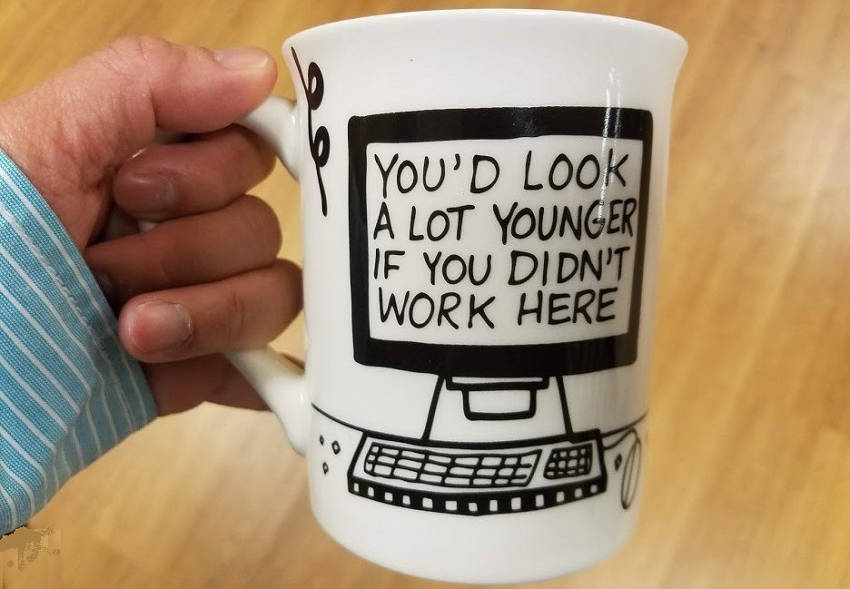This is a great article and so on point. “Things” only make you happy for a while and then you return to whatever steady state you are normally in. You are basically as happy as you make up your mind to be. Thanks for sharing.

One of the wonderful perks everyone at my workplace takes for granted is free coffee. According to our office manager, the company spends almost a thousand dollars every month on coffee alone.
With dozens of boxes of well-known and exotic brands stacked on the top shelf, our office pantry has enough variety of K-cups to cover each and every employee at the site on any given day. And there are several dozens of us in the office.
And yet, twice a day, on every coffee break, my teammates meticulously weigh, grind, and brew exotic coffee beans they independently bought and imported from Africa.
In contrast, my daily routine consists of grabbing a free K-cup from one of the boxes and brewing it using the in-house Keurig machine.
Then one day, a teammate finally asked.
“Aren’t you tired of drinking the same kind of coffee?? I’m ordering one batch tomorrow— freshly roasted from Ethiopia. It’s only $19 per bag.”
“No, thanks. Actually, I don’t drink the same kind every day. There are hundreds of flavors to pick from on the shelves,” I replied.
“Yeah, but they’re all K-cups,” he countered.
“Well, they taste better when they are free. Besides, I still drink instant coffee at home. So they’re actually an upgrade compared to what I’m used to,” I explained.
“Have you heard of the term Hedonic Treadmill?” I asked, smiling profusely.
I quickly added, “I’m actually saving the best for last, my choice of coffee included.”
My teammates looked at me like I was from another planet. Either that or they were disgusted by the mere mention of instant coffee.
What is the Hedonic Treadmill?
Say, you’ve been putting up with a crappy Android phone with a cracked screen. Then, your rich uncle suddenly gifted you with the latest iPhone. I bet you’d be smiling from ear to ear as soon as you unwrap the package.
But your level of happiness will slowly wane down as you get used to the phone. As time passes, the feeling eventually dissipates until you’re back to the same level of happiness you were prior to receiving the gift.
Psychologists refer to this phenomenon as hedonic adaptation, also known as the hedonic treadmill. It’s the observed tendency of humans to quickly return to a relatively stable level of happiness despite major positive or negative events or life changes.
The same phenomenon happens to lottery winners. In a study conducted by Stockholm and NY researchers, it was found that months after winning their average reported level of happiness had increased no more than that of a controlled group who hadn’t won the lottery.
Most people have a base level that is more or less constant throughout their lives. At first, the novelty of better food, fancy vacations, and more beautiful homes can make you feel like you’re living in a wonderland. But as you get used to those things, you revert to your base level of happiness.
The same study also studied people who suffered from an accident that left them paralyzed. The reported level of happiness, months after the accident, is at levels approaching their original baseline.
Hedonic adaptation may inhibit our enjoyment of positive changes, but it also enables our resilience to overcome adversity.
Getting stuck in the Hedonic Treadmill
Say you’re married and have two kids. You’re trying your best to get promoted at work. Because if you do, your life will change— you’d be able to replace your 10-year-old car, buy new clothes for your wife, and finally take your kids to Disneyworld.
Being a hard worker, you get a promotion. For a day or two, you’re walking in the air. You’re happy.
A few weeks later, you notice your neighbor drive off in his new car— a shiny $40,000 Tesla Model 3. You suddenly want one.
So you’ll work even harder to get a second promotion. Because if you do, your life will change.
Being the hardest worker, you get the promotion. You buy a Model 3. For a day or two, you’re on cloud nine. You’re ecstatic.
Months later, the same neighbor drives off in a Model S. Suddenly, you want an upgrade.
It goes on, and on, and on…
Until one day, you drop dead from the effects of stress.
Your neighbor attends your funeral and offers his shoulder to your grieving wife. It turns out he works for a Tesla dealership.
Final thoughts
Hedonic adaptation can be good or bad, depending on how you react to it. Lifestyle inflation by itself is not bad. I believe that one should always enjoy the fruits of one’s labor. You certainly don’t want to live like a college student in your 40s.
The problem is when it becomes a stumbling block to other more important goals: paying off debt, saving and investing for retirement, and the kids’ college.
Working hard and having a great income is one of the keys to achieving financial independence early. But consuming as much as possible obviously isn’t. Unless you want to compete in the rat race.
For the record: I’m not too fond of instant coffee, either. I only hedonically adapted to the taste, after our coffee brewer broke.


